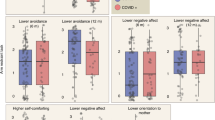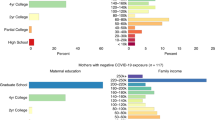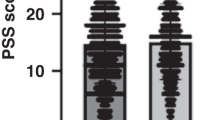Abstract
Background
Studies have shown that infant temperament varies with maternal psychosocial factors, in utero illness, and environmental stressors. We predicted that the pandemic would shape infant temperament through maternal SARS-CoV-2 infection during pregnancy and/or maternal postnatal stress. To test this, we examined associations among infant temperament, maternal prenatal SARS-CoV-2 infection, maternal postnatal stress, and postnatal COVID-related life disruptions.
Methods
We tested 63 mother–infant dyads with prenatal maternal SARS-CoV-2 infections and a comparable group of 110 dyads without infections. To assess postnatal maternal stress, mothers completed the Perceived Stress Scale 4 months postpartum and an evaluation of COVID-related stress and life disruptions 6 months postpartum. Mothers reported on infant temperament when infants were 6-months-old using the Infant Behavior Questionnaire-Revised (IBQ-R) Very Short Form.
Results
Maternal SARS-CoV-2 infection during pregnancy was not associated with infant temperament or maternal postnatal stress. Mothers with higher self-reported postnatal stress rated their infants lower on the Positive Affectivity/Surgency and Orienting/Regulation IBQ-R subscales. Mothers who reported greater COVID-related life disruptions rated their infants higher on the Negative Emotionality IBQ-R subscale.
Conclusions
Despite no effect of prenatal maternal SARS-CoV-2 infection, stress and life disruptions incurred by the COVID-19 pandemic were associated with infant temperament at 6-months.
Impact
-
SARS-CoV-2 infection during pregnancy is not associated with postnatal ratings of COVID-related life disruptions, maternal stress, or infant temperament.
-
Postnatal ratings of maternal stress during the COVID-19 pandemic are associated with normative variation in maternal report of infant temperament at 6 months of age.
-
Higher postnatal ratings of maternal stress are associated with lower scores on infant Positive Affectivity/Surgency and Orienting/Regulation at 6 months of age.
-
Higher postnatal ratings of COVID-related life disruptions are associated with higher scores on infant Negative Emotionality at 6 months of age.
Similar content being viewed by others
Log in or create a free account to read this content
Gain free access to this article, as well as selected content from this journal and more on nature.com
or
Data availability
The datasets generated during and/or analyzed during the current study are available from the corresponding author on reasonable request.
References
Ollivier, R. et al. Mental health & parental concerns during Covid-19: the experiences of new mothers amidst social isolation. Midwifery 94, 102902 (2021).
Wastnedge, E. A. et al. Pregnancy and Covid-19. Physiol. Rev. 101, 303–318 (2021).
Taubman-Ben-Ari, O. & Ben-Yaakov, O. Distress and apprehension among new parents during the Covid-19 pandemic: the contribution of personal resources. Am. J. Orthopsychiatry 90, 810 (2020).
Prime, H., Wade, M. & Browne, D. T. Risk and resilience in family well-being during the Covid-19 pandemic. Am. Psychol. 75, 631 (2020).
Rothbart, M. K. Temperament, development, and personality. Curr. Direct. Psychol. Sci. 16, 207–212 (2007).
Gartstein, M. A. & Rothbart, M. K. Studying infant temperament via the Revised Infant Behavior Questionnaire. Infant Behav. Dev. 26, 64–86 (2003).
Gartstein, M. A., Knyazev, G. G. & Slobodskaya, H. R. Cross-cultural differences in the structure of infant temperament: United States of America (US) and Russia. Infant Behav. Dev. 28, 54–61 (2005).
Putnam, S. P., Ellis, L. K. & Rothbart, M. K. The structure of temperament from infancy through adolescence. Adv. Res. Temperam. 165, 182 (2001).
Putnam, S. P., Rothbart, M. K. & Gartstein, M. A. Homotypic and heterotypic continuity of fine‐grained temperament during infancy, toddlerhood, and early childhood. Infant Child Dev. 17, 387–405 (2008).
Rothbart, M. K., Ahadi, S. A. & Evans, D. E. Temperament and personality: origins and outcomes. J. Pers. Soc. Psychol. 78, 122 (2000).
Karimi-Zarchi, M. et al. Vertical transmission of coronavirus disease 19 (Covid-19) from infected pregnant mothers to neonates: a review. Fetal Pediatr. Pathol. 39, 246–250 (2020).
Kyle, M. H. et al. A review of newborn outcomes during the COVID-19 pandemic. Semin. Perinatol. 44, 151286 (2020).
Liu, W. et al. Clinical characteristics of 19 neonates born to mothers with Covid-19. Front. Med. 14, 193–198 (2020).
Boulanger-Bertolus, J., Pancaro, C. & Mashour, G. A. Increasing role of maternal immune activation in neurodevelopmental disorders. Front. Behav. Neurosci. 12, 230 (2018).
Laplante, D. P., Brunet, A. & King, S. The effects of maternal stress and illness during pregnancy on infant temperament: project ice storm. Pediatr. Res. 79, 107–113 (2016).
Dombrowski, S. C., Martin, R. P. & Huttunen, M. O. Association between maternal fever and psychological/behavior outcomes: a hypothesis. Birth Defects Res. Part A 67, 905–910 (2003).
Boksa, P. Effects of prenatal infection on brain development and behavior: a review of findings from animal models. Brain Behav. Immun. 24, 881–897 (2010).
Schwartz, D. A. & Graham, A. L. Potential maternal and infant outcomes from coronavirus 2019-Ncov (Sars-Cov-2) infecting pregnant women: lessons from SARS, MERS, and other human coronavirus infections. Viruses 12, 194 (2020).
Di Mascio, D. et al. Outcome of coronavirus spectrum infections (Sars, Mers, Covid-19) during pregnancy: a systematic review and meta-analysis. Am. J. Obstet. Gynecol. MFM 2, 100107 (2020).
Felitti, V. J. et al. Relationship of childhood abuse and household dysfunction to many of the leading causes of death in adults: the Adverse Childhood Experiences (Ace) Study. Am. J. Prev. Med. 14, 245–258 (1998).
Pesonen, A.-K., Räikkönen, K., Strandberg, T. E. & Järvenpää, A.-L. Continuity of maternal stress from the pre-to the postnatal period: associations with infant’s positive, negative and overall temperamental reactivity. Infant Behav. Dev. 28, 36–47 (2005).
Bush, N. R. et al. Effects of pre-and postnatal maternal stress on infant temperament and autonomic nervous system reactivity and regulation in a diverse, low-income population. Dev. Psychopathol. 29, 1553–1571 (2017).
Rodríguez‐Soto, N. C. et al. The impact of prenatal maternal stress due to potentially traumatic events on child temperament: a systematic review. Dev. Psychobiol. 63, e22195 (2021).
Provenzi, L. et al. Hidden pandemic: Covid-19-related stress, SLC6A4 methylation and infants’ temperament at 3 months. Sci. Rep. 11, 15658 (2021).
Provenzi, L. et al. Prenatal maternal stress during the Covid-19 pandemic and infant regulatory capacity at 3 months: a longitudinal study. Dev. Psychopathol. https://doi.org/10.1017/S0954579421000766 (2021).
Cohen, S., Kamarck, T. & Mermelstein, R. A global measure of perceived stress. J. Health Soc. Behav. 24, 385–396 (1983).
Lee, E.-H. Review of the psychometric evidence of the Perceived Stress Scale. Asian Nurs. Res. 6, 121–127 (2012).
Putnam, S. P., Helbig, A. L., Gartstein, M. A., Rothbart, M. K. & Leerkes, E. Development and assessment of Short and Very Short Forms of the Infant Behavior Questionnaire–Revised. J. Pers. Assess. 96, 445–458 (2014).
Parade, S. H. & Leerkes, E. M. The reliability and validity of the Infant Behavior Questionnaire-Revised. Infant Behav. Dev. 31, 637–646 (2008).
Evans, D. E. & Rothbart, M. K. Developing a model for adult temperament. J. Res. Pers. 41, 868–888 (2007).
Weathers, F. W. et al. The Life Events Checklist for Dsm-5 (Lec-5)–Standard. [Measurement Instrument]. https://www.ptsd.va.gov/ (2013).
Mäntymaa, M., Puura, K., Luoma, I., Salmelin, R. K. & Tamminen, T. Mother’s early perception of her infant’s difficult temperament, parenting stress and early mother–infant interaction. Nord. J. Psychiatry 60, 379–386 (2006).
Krol, K. M., Moulder, R. G., Lillard, T. S., Grossmann, T. & Connelly, J. J. Epigenetic dynamics in infancy and the impact of maternal engagement. Sci. Adv. 5, eaay0680 (2019).
Leerkes, E. M. & Zhou, N. Maternal sensitivity to distress and attachment outcomes: interactions with sensitivity to nondistress and infant temperament. J. Fam. Psychol. 32, 753 (2018).
Grey, K. R., Davis, E. P., Sandman, C. A. & Glynn, L. M. Human milk cortisol is associated with infant temperament. Psychoneuroendocrinology 38, 1178–1185 (2013).
Chronis-Tuscano, A. et al. Stable early maternal report of behavioral inhibition predicts lifetime social anxiety disorder in adolescence. J. Am. Acad. Child Adolesc. Psychiatry 48, 928–935 (2009).
Clauss, J. A. & Blackford, J. U. Behavioral inhibition and risk for developing social anxiety disorder: a meta-analytic study. J. Am. Acad. Child Adolesc. Psychiatry 51, 1066–1075. e1061 (2012).
Henderson, H. A., Pine, D. S. & Fox, N. A. Behavioral inhibition and developmental risk: a dual-processing perspective. Neuropsychopharmacology 40, 207–224 (2015).
Lahey, B. B. et al. Temperament and parenting during the first year of life predict future child conduct problems. J. Abnorm. child Psychol. 36, 1139–1158 (2008).
Gartstein, M. A. & Marmion, J. Fear and positive affectivity in infancy: convergence/discrepancy between parent-report and laboratory-based indicators. Infant Behav. Dev. 31, 227–238 (2008).
Funding
This work is supported by R01MH126531 to D.D., C.M., and R.M. and NSF-2051819 to D.A. This work was also in part funded by gift funds from Einhorn Collaborative to the Nurture Science Program at Columbia University Irving Medical Center.
Author information
Authors and Affiliations
Contributions
Substantial contributions to conception and design, acquisition of data, or analysis and interpretation of data: C.B., A.S., M.H.K., B.B., J.B., M.B., L.C., A.F., M.R.F., S.G., A.H., V.H., M.H., S.H., M.L., R.M., I.M., M.M., D.O., N.P., C.R., L.C.S., N.T., M.G.W., W.F., C.M., D.D., D.A. Drafting the article or revising it critically for important intellectual content: C.B., A.S., D.D., D.A. Approval of the version to be published: C.B., A.S., M.H.K., B.B., J.B., M.B., L.C., A.F., M.R.F., S.G., A.H., V.H., M.H., S.H., M.L., R.M., I.M., M.M., D.O., N.P., C.R., L.C.S., N.T., M.G.W., W.F., C.M., D.D., D.A.
Corresponding author
Ethics declarations
Competing interests
The authors declare no competing interests.
Ethics approval and consent to participate
All study participants completed consent forms prior to participation following guidelines of the CUIMC Institutional Review Board.
Additional information
Publisher’s note Springer Nature remains neutral with regard to jurisdictional claims in published maps and institutional affiliations.
Supplementary information
Rights and permissions
About this article
Cite this article
Bianco, C., Sania, A., Kyle, M.H. et al. Pandemic beyond the virus: maternal COVID-related postnatal stress is associated with infant temperament. Pediatr Res 93, 253–259 (2023). https://doi.org/10.1038/s41390-022-02071-2
Received:
Revised:
Accepted:
Published:
Issue date:
DOI: https://doi.org/10.1038/s41390-022-02071-2
This article is cited by
-
Effects of prenatal psychosocial stress and COVID-19 infection on infant attention and socioemotional development
Pediatric Research (2024)
-
Temperament and adolescent suicide attempts: a case-control study with multi-ethnic Asian adolescents
BMC Psychiatry (2023)
-
Maternal perceived stress and infant behavior during the COVID-19 pandemic
Pediatric Research (2023)



